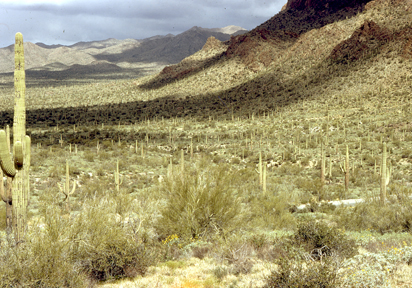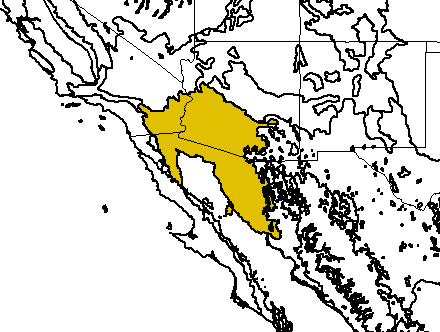
Giant saguaros (Carnegia gigantea) at Gate's Pass, Tucson Mt. Park, Tucson, Arizona (c) 2001 Maurice J. Kaufmann
Bioimages home (click on an image to enlarge)
view
this page in its intended navigation context
Sonoran Desert
(WWF
ecoregion NA1310)

Giant saguaros (Carnegia
gigantea)
at Gate's Pass, Tucson Mt. Park, Tucson, Arizona (c) 2001
Maurice J. Kaufmann

Source of bioregions data:
Olson, D. M. and
E. Dinerstein. The Global 200: Priority ecoregions for global conservation. (PDF
file) Annals of the Missouri Botanical Garden 89:125-126.
Distinctiveness (1=highest,4=lowest): 1
(globally outstanding)
41% of U.S. terrestrial bird species can be found here. 58 species of
reptiles are found in the U.S. portion of this desert as well as diverse species
of cacti.*
Conservation Status (1=most endangered, 5=most
intact): 4 (relatively stable)
40% of habitat is unaltered. Riparian habitats are severely degraded.
Development and overgrazing are threats.*
 Larrea tridentata
Larrea tridentata Ambrosia deltoidea
(bursage)
Ambrosia deltoidea
(bursage) Parkinsonia florida
(blue paloverde)
Parkinsonia florida
(blue paloverde) Parkinsonia microphylla
(yellow paloverde)
Parkinsonia microphylla
(yellow paloverde) Olneya tesota
(desert ironwood)
Olneya tesota
(desert ironwood) Carnegia gigantea
(saguaro)
Carnegia gigantea
(saguaro) Opuntia fulgida
(jumping or chain fruit cholla)
Opuntia fulgida
(jumping or chain fruit cholla) Stenocereus thurberi
(organ pipe cactus)
Stenocereus thurberi
(organ pipe cactus) Simmondsia chinensis
(jojoba)
Simmondsia chinensis
(jojoba) Fouquieria splendens
(ocotillo)
Fouquieria splendens
(ocotillo)
Some views from the ecoregion

Agave sp. south of Superior, AZ (c) 2004
Maurice J. Kaufmann
hires
Saguaro National Park and vicinity of Tucscon, AZ

Carnegia gigantea
(saguaro) and
Fouquieria splendens
(ocotillo) near Tucson (c)
2004 Maurice J. Kaufmann
hires


Carnegia gigantea
(saguaros) on slope, Saguaro National Park (c) 2004
Maurice J. Kaufmann
hires and
in the vicinity of Tucson
hires

Ferocactus wislizeni
(fishhook or Arizona barrel cactus),
Opuntia bigelovii
(teddy bear cholla),
Encelia farinosa (brittlebush, yellow), Jatropha cuneata
(limber bush, green on rt.) (c) 2004
Maurice J. Kaufmann
hires

Wasson Pk. Trail.
Encelia farinosa (brittlebush, yellow),
Fouquieria splendens
(ocotillo),
Parkinsonia microphylla
(yellow paloverde) (c) 2004
Maurice J. Kaufmann
hires

cacti, Saguaro Ntl. Park
hires

a wash, Saguaro Ntl. Park
hires
Organ Pipe Cactus National Monument, southwestern AZ

cholla cacti and spring wildflowers (c) 2001
Maurice J. Kaufmann
hires

Carnegia gigantea
(saguaro),
Stenocereus thurberi
(organ pipe cactus), Penstemon sp. (pink),
Encelia farinosa (brittlebush, yellow),
Simmondsia chinensis
(jojoba, dense dark green),
Larrea tridentata

Castilleja exserta ssp. exserta (owl clover, pink),
Lupinus sp. (lupine, blue) (c) 2004
Maurice J. Kaufmann
hires

(l-r)
Opuntia fulgida
(jumping or chain fruit cholla),
Fouquieria splendens
(ocotillo), Parkinsonia sp. (paloverde), and young
Carnegia gigantea
(saguaro) (c) 2004
Maurice J. Kaufmann
hires

Stenocereus thurberi
(organ pipe cactus),
Larrea tridentata

Eschscholzia californica (California poppies) in spring, southwestern Arizona (c) 2001
Maurice J. Kaufmann
hires
* Ricketts, T.H., E. Dinerstein, D.M. Olson, C.J. Loucks, et al. (1999) Terrestrial Ecoregions of North America: A Conservation Assessment. World Wildlife Fund - United States and Canada. Island Press, Washington, D.C. pp. 337-340.
Except as noted, images copyright 2002-2004 Steve Baskauf - Terms of use